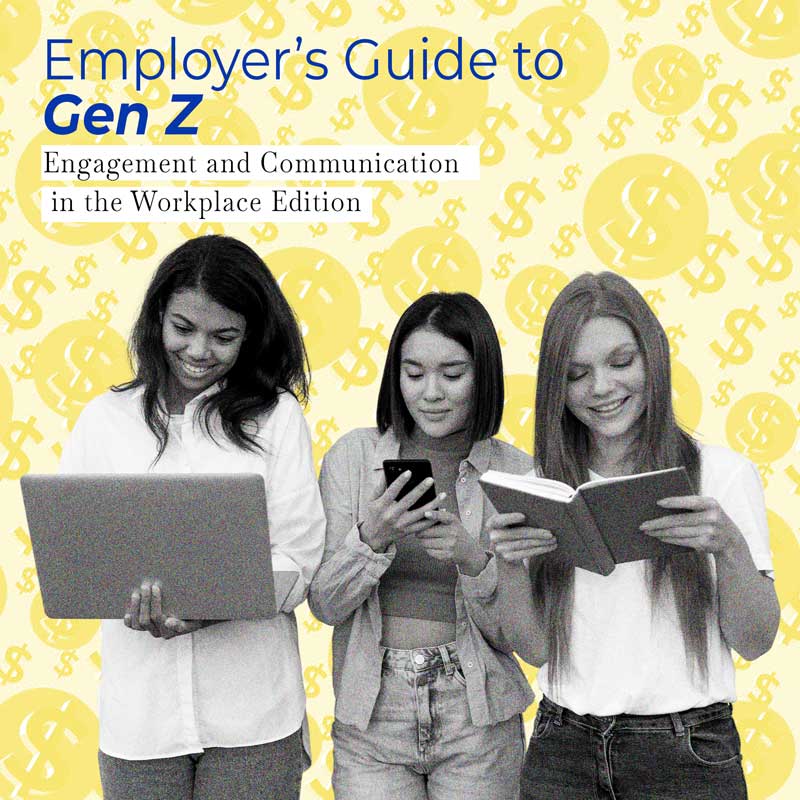CATEGORIES
#Gen Z #Inclusion and Impact #Work CultureOverview:
- Fostering a community-oriented workplace culture that values inclusion, diversity, and the diverse perspectives of Gen Z employees.
- Adapting to workplace practices like prioritizing authenticity and embracing technological advancements.
- Addressing challenges like short attention spans and tech reliance with innovative solutions.
- Promoting a positive and productive workplace culture where every employee thrives.
Employers face a unique challenge due to the stark differences in generational attitudes, slang, social cues, and behavioral norms. Also, varying standards in workplace interaction add to the complexity. Engaging with Gen Z employees can also be challenging. It is important to understand how to engage Generation Z in the workplace for businesses and companies. This will help them adapt to the constantly changing generational attitudes and cultural norms of their employees.
Decoding Gen Z
Before we understand how to engage and communicate with Gen Z, it’s important to know what they are really like. Here, we will decode how Gen Z sets boundaries and prioritizes growth and development. Overall, creating a welcoming and respectful workspace is key to engaging this new generation. Let’s discuss this more:
Peace & Love: Community, Inclusivity, Diversity
The new era has ushered in a new set of Generation Z values in the workplace which they prioritize more than the previous generation. It’s pretty clear that Gen Z has increasing cultural and political awareness. They value a community that genuinely supports growth and development. Hence, it becomes very important to foster a community that values the diverse inputs and opinions of its employees. Also, taking into consideration the differences in backgrounds, culture, and normative practices is essential. Another important aspect is considering not only inclusivity but the overall creation of a welcoming ecosystem in the office. This should value the skills and contributions of employees while remaining considerate of how their identity may affect interactions.

Boundaries, Boundaries, Boundaries
It is no surprise that Gen Z employees understand the value of mental health and work-life balance. Hence, it is crucial to recognize and validate their new standards. Many young people stick to the predefined schedule or working hours and often do not adhere to traditional ideas. They dislike the idea of maintaining 24/7 availability for out-of-office communication. Therefore, it’s important to streamline all necessary information for discussion during those open hours. Respect for personal time and non-work commitments can significantly enhance how to engage Gen Z in the workplace.
Opportunities for Growth and Development
Despite some perceptions of Gen Z as self-righteous and morally rigid, most actually emphasize growth and development. They see these elements as integral to the office experience. The opportunities provided to them by a job do not merely begin and end at the economic aspects. Another essential aspect for them is the individual level. That’s why- assigning reasonably challenging tasks can further develop their abilities.
The quality of their contributions depends on their interest, attitude, and engagement with job responsibilities. It also depends on how well they collaborate with the rest of the team. Every employer should remember that the ability to adapt to changing circumstances can either make or break a company.

How to Engage Generation Z in the Workplace?
Companies must ensure that their workplace ethos and regulations are meeting the values and anticipations of this generation. Ethos refers to the character or guiding beliefs of a person, group, or institution.
By now, we’ve recognized the need to engage Generation Z for a productive and motivated workforce. Here are some ways on how to engage Generation Z in the workplace:
Embrace and Explain the “Why”
Gen Z places a high premium on understanding the “why” behind their tasks and roles. Companies need to explain the specifics of training and roles clearly. They should also show how these roles fit into the broader corporate mission. This method taps into Gen Z’s desire for meaningful work, boosting their engagement and productivity.
Cultivate Authenticity
Well, genuine interactions are crucial in building trust with this generation. Gen Z’s pursuit of authenticity is ambitious and can easily spot when companies do not ‘walk their talk’. Companies can foster a loyal and engaged Generation Z in the workplace by aligning practices with the organization’s core values.

Adapt to Technological Fluidity
Gen Z workers, being digital natives, do well in tech-oriented environments. Companies must embrace technological changes to keep up with their pace, including integrating new tools and offering flexible work arrangements. This ensures they remain interesting to this tech-savvy generation.
Effective Gen Z Communication
Though Generation Z has some similarities with previous generations, their communication style and workplace needs are pretty different. Now, that we have understood GenZ briefly , let’s understand how to communicate with them effectively:
Embody Authenticity and Transparency
It’s essential to prioritize honesty and authenticity when communicating with Gen Z. We need to ensure context and transparency in decision-making processes. It’s also important to appreciate their contributions. This emphasizes how their work makes a difference, giving them a sense of purpose and fulfillment.
Don’t forget, when Gen Z is happy, they’re bursting with creativity and fresh ideas!
Foster Open Dialogue and Inclusive Language Practices
The best way is to encourage open communication where people of all ages feel empowered to share their preferences and opinions. Also, make sure you ask for clarification when needed. Basically, encouraging transparency and openness is the key. Authentic engagements play a vital role in establishing trust with Generation Z.
Cultivate a Culture of Lifelong Learning
Here, the key is to start promoting a culture of continuous learning. Such a culture would encourage the team members to embrace evolving communication trends and techniques. If we integrate Gen Z’s knowledge into our training programs, we can enhance our overall understanding and skills. This will help everyone grow and keep our team strong and adaptable.
Addressing Potential Challenges
Now, working with Gen Z presents its unique set of challenges. Firstly, short attention spans among GenZ are common. In today’s world, where people are constantly engaged with social media and their cell phones, attention spans have significantly decreased. So, how do we really engage Generation Z in the workplace?

In order to cater to this, breaking tasks into smaller, manageable chunks can be helpful. Clear and concise communication is also needed to maintain engagement and facilitate information retention. However, it’s equally important to balance their dependence on technology with opportunities for face-to-face interactions. This nurtures essential interpersonal skills crucial for collaboration and relationship-building. Also, organizations can manage Gen Z’s expectations for promotions by setting achievable career progression timelines. This promotes a sustainable approach to growth and skill development, ensuring long-term success in the workforce. These practices can definitely contribute to a positive and productive workplace environment and can help in contributing to shaping a better future for the next generation.
Conclusion:
In conclusion, understanding and adapting to Gen Z’s needs is crucial for a productive workplace. It starts with being authentic, encouraging open communication, and promoting diversity. Therefore, cracking how to engage Generation Z in the workplace can do wonders. Companies should create a place where Gen Z genuinely feels valued. We need to prioritize Gen Z’s needs to build a strong workforce ready for success.
FAQs:
What are the key values of Generation Z in the workplace?
Generation Z values inclusivity, diversity, continuous learning, and meaningful work experiences.
How can employers effectively engage Generation Z in the workplace?
Gen Z can be engaged using strategies that promote a culture of continuous learning and offer opportunities for growth and development.
How can companies inculcate a sense of purpose for Gen Z?
Companies can foster purpose by aligning their mission with meaningful work, providing opportunities for community involvement, and recognizing employee contributions.


